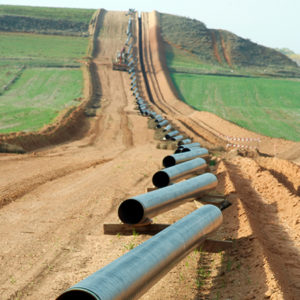Brussels: Monday, May 8, 2017 – A new report from Food & Water Watch and its sister organization, Food & Water Europe, traces the links between fracking and pipelines in Pennsylvania and a Scottish energy billionaire’s elaborate and dangerous plan to ship gas liquids across the Atlantic.
The report, “The Trans-Atlantic Plastics Pipeline: How Pennsylvania’s fracking boom crosses the Atlantic,” tracks how the fracking boom in the United States has spawned a resurgence in petrochemical and plastics manufacturing, which presents environmental hazards apart from those associated with drilling. Ineos, Britain’s largest privately-held company, has contracted with US-based drilling companies to supply it with ethane, a gas liquid used to make plastics. Over the last few years, the company has rolled out a fleet of ‘dragon ships’ to supply plants in Norway and Scotland, with the first shipment of shale gas arriving in late 2016. Recently it was reported that the company’s Grangemouth plant was rated as ‘poor’ by the Scottish Environment Protection Agency, which pointed to nine separate incidents in 2016, including several major discharges of sulphur.
“Fracking is creating a public health and climate disaster while propping the highly polluting plastics industry,” said Wenonah Hauter, executive director of Food & Water Watch and Food & Water Europe. “People on both sides of the Atlantic are suffering the costs, with extremely detrimental effects to our global environment – everything from air pollution and climate altering emissions to the proliferation of plastic waste can be tied to the companies benefiting from this poisonous process.”
The report shows how this ‘virtual pipeline’ poses serious threats to health and public safety on both sides of the Atlantic. The Ineos export strategy will drive more fracking in Pennsylvania, with all the accompanying water and air pollution that has been well-documented over the last several years of drilling in the state. This project requires the building of an additional pipeline, Mariner East 2. Communities along the 350-mile route of the pipeline, concerned about public safety threats posed by leaks and explosions, are fighting against the pipeline’s construction through a mix of municipally-oriented strategies and nonviolent direct action tactics. And in Scotland, Ineos will be ‘cracking’ the ethane to make ethylene, an industrial process that causes air pollution and creates additional plastic litter, like the small pellets called nurdles that are littering shorelines across the United Kingdom.
Earlier this month, the Ineos petrochemical facility in Grangemouth, Scotland had a substantial ethylene leak that forced the evacuation of employees. The resurgent plastics production fueled by Pennsylvania fracked gas could put even more communities at risk of industrial accidents.
All of the companies involved in the trans-Atlantic pipeline, the report shows, have poor environmental records. The Grangemouth facility has been repeatedly cited by Scottish authorities for emissions and pollutions violations, along with workplace safety violations. Ineos CEO James Ratcliffe once likened pollution to getting a flat tire: “It is like a puncture in your car — occasionally you get a puncture and occasionally we have an accident in chemicals.” One of the drilling companies in Pennsylvania, Range Resources — perhaps best known for a water contamination incident in Texas — has been fined almost USD $21 million (€19 million) by state regulators. The company has been charged with over 500 health and safety violations between 2005 and 2016.
Sunoco, the company behind the new Mariner East pipelines, had a higher rate of oil spills than any of its competitors in the United States. It recently completed a merger with Energy Transfer Partners, the company behind the highly controversial Dakota Access pipeline. Communities along the pipeline route are seeking ways to halt construction of Mariner East 2; the company eventually plans to construct an additional parallel pipeline to carry more gas liquids for export.
“It’s time to stop this absurdity once and for all. We don’t need more plastics, petrochemicals or fracked hydrocarbons. What we do need is fresh air, clear drinking water and an intact environment,” said Andy Gheorghiu, policy advisor for Food & Water Europe.
“People on both sides of the Atlantic have already started realizing that we need to act in unity, expanded over sea and land borders. And united, we will have the power to make the necessary difference and stop companies like Ineos and Sunoco from further polluting our planet. The time is right and the time is now.”
Food & Water Watch offers several recommendations to communities and political leaders both sides of the Atlantic, starting with a complete ban on fracking everywhere, a ban on fossil fuel imports, and ending fossil fuel infrastructure projects that are harming the environment and contributing to the mounting threats posed by climate change.
Contact: Andy Gheorghiu, Food & Water Europe, Fracking Policy Advisor, Food & Water Europe, +49 (0) 5631 50 69 507 (land), +49 (0) 160 20 30 974 (mobile), agheorghiu(at)fweurope.org



